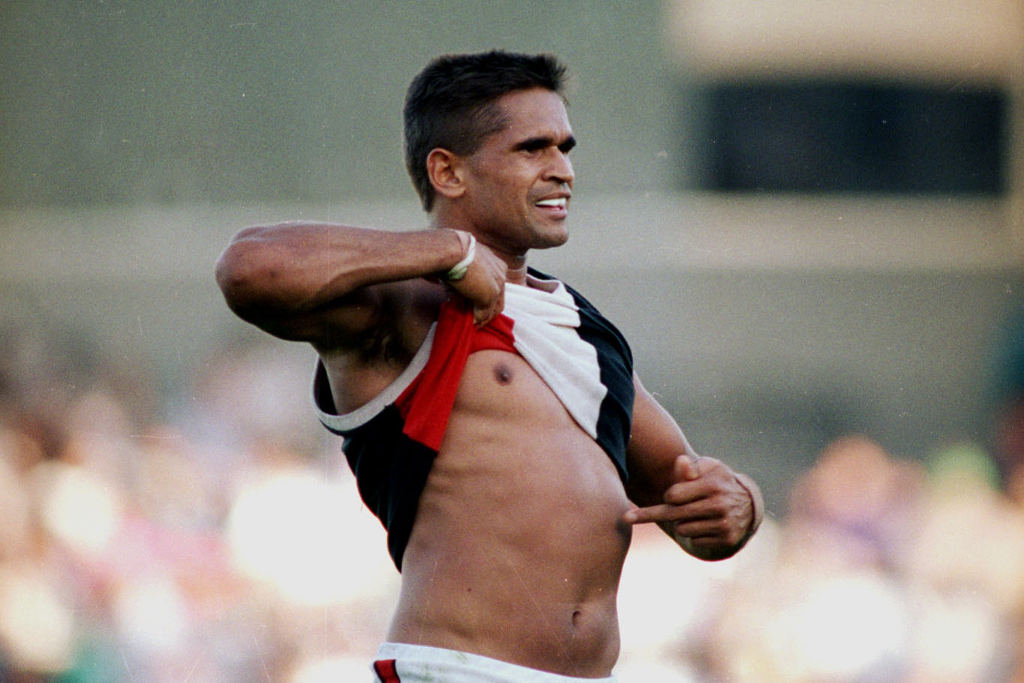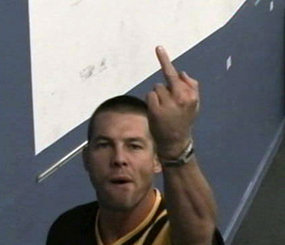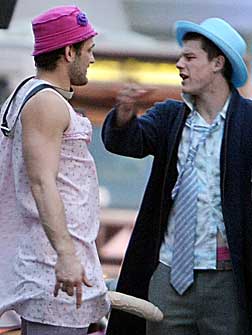On Loving A Sport, But Hating Its Culture
To suggest that racism, sexism and homophobia is an intrinsic part of footy culture is to make it so.

So, it transpires that a billion-dollar industry that places young, testosterone-rich men on pedestals (on the condition that they ram into each other at high velocities for our entertainment) may have something of a seamy underbelly. Not exactly a huge surprise, but it’s still hard not to be impressed at the speed with which the AFL’s sensitive-new-age-code image has come unstitched this year.
Eddie McGuire’s PR masterclass over the past week happened in the context of Anna Krien’s Night Games, a new book which explores intermingled issues in Australian society – namely, the deification of young athletes, and the objectification of women – through the prism of a footballer’s rape trial. The book is perhaps most unsettling for Krien’s persuasive argument that the best aspects of football – the mateship, the self-sacrifice – are bound up with the worst. “The problem is not the game per se,” Krien writes, “but the macho culture of humiliation that tends to shadow and control it.”

Night Games, in turn, came hot on the heels of revelations that Essendon are a pack of doped-up cyborgs, coached by a wax-faced Dorian Gray with a tummy full of track marks (allegedly). In light of that supertanker-sized load of unpleasantness, I did what any conflicted sport fan would do. I wrote a think piece.
The AFL Made Me The “Man” I Am Today
I love sport, and I love Aussie Rules. I love it even though I know that footy breeds, symbolises and reflects some of Australian society’s shittiest aspects. I loved the game when I was playing Auskick and girls were allowed and no-one really tackled, and the White Knight bars that they sold at the canteen for 30 cents were as exciting as the game itself (except for the kids with braces).
I still loved the game after the girls were politely moved on, after the physical contact developed a sadistic aspect, after the White Knights were bumped up to an extortionate 50 cents. I loved the game as a teenager, even as I withdrew socially from my teammates and their pack mentality, their sledging, ‘flying the flag’, their contrived hostility, and their bizarre combination of homophobia and homo-eroticism.

As a fan, I love that football offers the mediocre hordes (to which I belong) the feeling of being part of something greater, something more than the squishy sack of tissue and plasma that is my corporeal form. In a godless age, where all the major –isms have died a slow, fitful death, sport can bring about a state of ecstasy like few things other than maybe music and, uh, ecstasy. It offers a rare communal experience in a lonely, mediated epoch.
Then there’s the fact that footy is pretty much a social ‘get out of jail free’ card in Melbourne, a conversational life-jacket that allows you to hang in there until the tram finally comes, or until the canapés are served.
I love seeing 36 men pour every fibre of their being into obtaining possession of an oddly-shaped ball, in order to usher it between two posts at the end of an oddly-shaped field. And I love seeing outrageous feats of athleticism being performed in the service of this completely arbitrary objective. I am so gripped by anomie that I find it heartening to think that people could care this much about anything.
My love of the game predates my awareness of all the negative aspects of sporting culture. I experienced the deep satisfaction of belonging to a tribe well before it occurred to me that such unblinking devotion could lead to some rather unsavoury places. I was a precocious six-year-old when my hero, Nicky Winmar, responded to a blizzard of racist abuse from across the fence by lifting his jersey and pointing proudly at his dark skin. “Are they just angry because he’s better than them?” I asked my dad. “Essentially, yes,” Dad answered.
I learned two things that day: Collingwood fans are objectionable, and the ugliness of humanity tends to be magnified by the safety of numbers. To its credit, the AFL has never taken racism lightly since then, and has become a community leader in terms of engagement with Indigenous Australia — despite the sort of shit that Adam Goodes had to deal with last week still being reasonably common. (See Hugh Robertson’s examination for a more incisive discussion on the AFL and race than I could offer).
Straight, White, Male – You Beaut!
How, though, does one reconcile oneself with the knowledge that the AFL is a bastion of institutional sexism? That a pitiful number of administrative roles are held by women, despite the fact that they form roughly 50% of the AFL’s audience? Can I really mythologise that ‘communal experience’ when it involves ritually ogling goal umpire Chelsea Roffey, the only visible female in the AFL organisation?
What amount of positives could outweigh these negatives? Arguably none, but the same could be said for a life lived in the cities of the 21st century – an experience that can be draining, alienating, endlessly challenging, and utterly exhilarating. No human endeavour of any consequence can have its worth determined with an abacus, and sport is no different.
I don’t like going to the pub and being told that I look like Nick Riewoldt, then being asked, “Are you a poof like him?”
I don’t like seeing my football-loving female friends being ignored when ‘the boys’ want to talk footy.
And I don’t want to hear commentators talk about an Indigenous player’s ‘sixth sense’, while praising a white player’s ‘footy brain’.
All of the above is total bullshit; to suggest that it is an intrinsic part of the culture is to make it so, to abandon the idea that it could be purged from the game. Sport matters. It fulfills some primal need that a lot of us feel, and that none of us fully understand. I am wary of using the intellect to rationalise decisions that are made with the gut, but to celebrate the beauty of the contest while abhorring that which surrounds it seems not only possible, but valuable. Sport’s power lies in its very indeterminacy. It allows us to participate and derive meaning from it in whatever way we choose. By leaving the conversation because we find aspects of sporting culture objectionable, we rob that conversation of its most progressive voices.
Can a violent, tribal ritual like AFL football ever truly progress, though? I don’t know, but I’ll still be watching. At home, alone. With the sound off.
–
Edward Sharp-Paul is a freelance writer and drink-pourer from Melbourne. He mostly likes music and the sportz, and his words can be found at FasterLouder, Mess+Noise, Beat and The BRAG. He also runs his mouth off under the cunning alias @e_sharppaul.